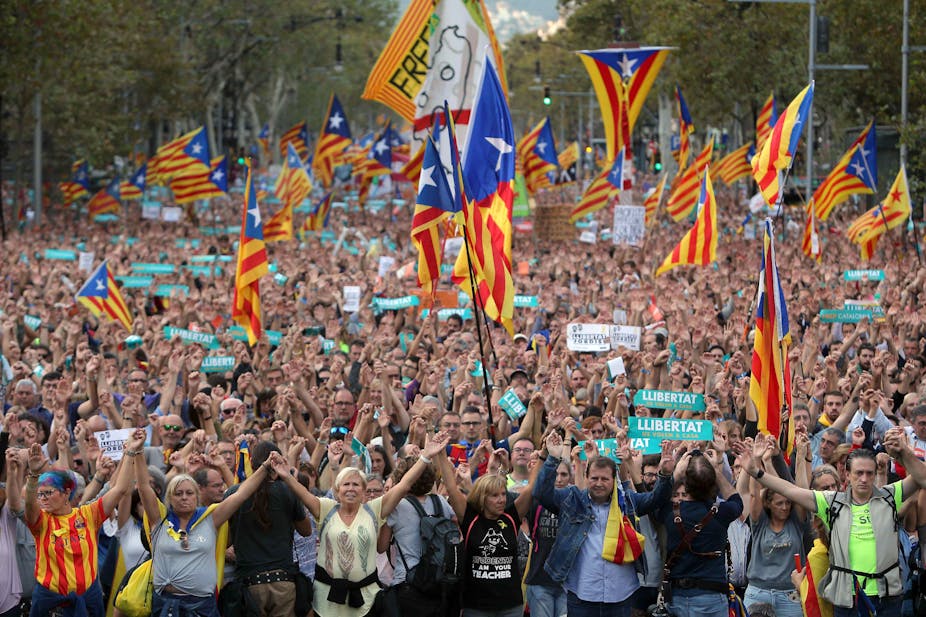Amid reports swirling that Catalonia’s president, Carles Puigdemont, was either set to call new elections to the Catalan parliament or declare full independence from Spain, he abruptly cancelled a scheduled press conference on October 26. When he did speak, he did not call elections and said it was up to Catalonia’s parliament to decide how to act.
For Puigdemont, calling new elections would be a high-risk tactic. Even though many have come to deeply dislike the government’s violent response to Catalonia’s independence referendum on October 1, there is also dissatisfaction among Catalans who do not want independence. Puigdemont cannot guarantee that another poll will deal him a stronger hand. It could be seen as a tactic to remove the threat of an imposition of Article 155 of the Spanish Constitution, which would revoke Catalonia’s powers of autonomy – although the prime minister, Mariano Rajoy, has not officially confirmed that this would be the case.
Following Puigdemont’s semi-declaration of independence on October 10, he called for an opening of negotiations with Rajoy. But due to errors on both sides, the possibility for constructive dialogue remains feeble.
The decision of Catalan nationalists to commit to a legally binding referendum, despite the Constitutional Court ruling it to be illegal, was a statement intended to draw a line in the sand. The Rajoy government, however, fanned the fire rather than put it out. By bringing the Civil Guard onto the streets of Barcelona, and using every little bit of the crowd control legislation passed in July 2015, the government succeeded in turning an increasing amount of Catalans against them. The arrests of Jordi Cuixart and Jordi Sanchez, the leaders of the two main nationalist organisations in Catalonia, also sparked further outrage.
If, against the current tide, the parties do manage to open negotiations, there would immediately be pressure for a new referendum that has the support of the Spanish parliament. But, after a turbulent period with two general elections in the span of six months in 2016, the Spanish parliament is highly divided and fragmented. The two main parties, Rajoy’s Partido Popular (PP) and the socialist Spanish Socialist Workers’ Party (PSOE), are facing a rising challenge from the newcomers Podemos, on the left, and the centre-right Cuidadanos party.
The current circumstances could spur calls for new elections to the Spanish central parliament too. Rajoy, who is in a weak position and presides over a minority government, technically has little interest in causing a great political stir. At the same time, he is afraid of being seen as weak in a term which has seen prominent members of his party on trial for corruption and Rajoy called as a witness.
The electoral base of Rajoy’s PP, which has some uncomfortable connections to the Francoist past, has little patience for the nationalities question and has often resisted increased autonomy for Spain’s regions. However, even the PSOE – led by the newly re-elected Pedro Sanchez – is largely unwilling to make great concessions to the nations: Catalonia, the Basque country and Galicia. The GAL scandal of the 1990s, when it emerged that the PSOE government had funded a death squad against the Basque-separatist group ETA, is a reminder of how toxic the issue of national independence remains, both on the left and on the right.
Revoking autonomous powers
Rajoy’s government plans to invoke Article 155, a paragraph of the Spanish constitution which allows the central government to revoke the powers of autonomous communities if the: “autonomous community does not fulfil the obligations imposed upon it by the Constitution or other laws, or acts in a way seriously prejudicing the general interests of Spain.”

This article has only ever been seriously considered once before, when the Gonzalez government in the late 1980s required the Canary Islands to comply with new fiscal rules as per EU regulation. In this instance, Article 155 was never actually imposed since the Canary Islands complied with the request and the government did not suspend the powers of the autonomous community. Its imminent invocation is terra incognita for Rajoy.
Article 155 does not enable a complete elimination of the autonomous community, simply a circumscription of its powers, be that political or economic. These powers could be related to the fiscal autonomy of the region, effectively rendering the Catalan parliament superfluous. Rajoy might also opt to take charge of the Catalan police force, the Mossos d’Esquadra. If the Mossos choose to remain loyal to the region, further intervention by the Guardia Civil, which answers to the central state, may seem necessary to Rajoy.
Need for constitutional reform
When Franco died in 1975, there were high hopes that Spain would successfully transition to democracy. In many ways, this is what has happened, and Spain consistently performs well in Freedom House rankings on the quality of democracy. But the recent crisis in Catalonia has raised questions about whether Spain has really moved on from its violent past – and whether the Spanish constitution remains fit for purpose. It has proved rigid and out of touch with people’s lives, and is losing legitimacy.
The Constitutional Court is a heavily politicised body, and several of its members have strong ties to Rajoy’s PP. Of its 12 members, eight are chosen by parliament, two by the government, and two by the Consejo General del Poder Judicial, the highest judicial body in Spain. With a third of the members on the Constitutional Tribunal being renewed every three years, this gives a government with a parliamentary majority ample room to influence the membership of the court.
The Spanish constitution is being read through a particular political prism, reflecting the hostility of the Spanish right towards the nationalities. Constitutional reform is necessary, but will be impossible to realise without support from both the PP and PSOE.
This piece was commissioned in collaboration with the Campaign for Social Science.

